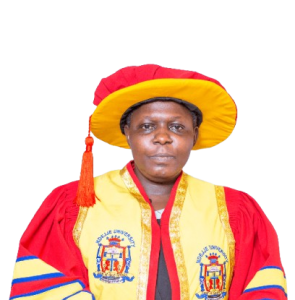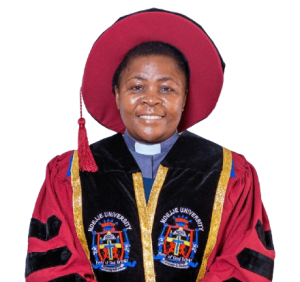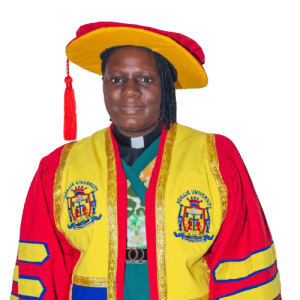At the National Council for Higher Education (NCHE) Expo 2025, Ndejje University presented some of its most groundbreaking projects aimed at addressing Uganda’s pressing water challenges, led by the Water Research and Development Centre (WRDC) housed in the Faculty of Engineering and Survey. WRDC is at the forefront of developing innovative solutions to tackle the water issues faced by Uganda and the broader East African region, demonstrating the university’s commitment to advancing sustainable water management practices through cutting-edge research and technology.
A Vision for Sustainable Water Management
The WRDC at Ndejje University is dedicated to advancing the field of water science and technology through a range of research projects that aim to improve water management practices locally and globally. The center not only works on research but also collaborates with local communities and institutions to implement practical solutions that benefit agricultural productivity, environmental conservation, and resource management.
At the NCHE Expo 2025, the Center presented two standout projects that reflect the university’s contribution to sustainable development and AI innovation:
1. The NDU Smart Irrigation System Prototype: Revolutionizing Agricultural Water Usage
One of the key highlights of the university’s showcase at the NCHE Expo 2025 was the NDU Smart Irrigation System, an advanced technological solution that optimizes water usage, reduces waste, and promotes healthy plant growth. This system utilizes cutting-edge sensor technology to collect real-time data on soil moisture, temperature, humidity, and weather patterns, enabling it to adjust irrigation schedules and water distribution to precisely meet the needs of crops.
By integrating automation and AI, the system’s controller adjusts irrigation in real-time based on factors like soil type, crop water requirements, and weather forecasts, ensuring that water is applied only where it is needed. Features such as automatic shut-off during rainfall or high winds, as well as remote monitoring capabilities, ensure efficient water use while reducing wastage.
The AI integration in the NDU Smart Irrigation System was emphasized as a best practice example for AI innovation, showcasing how interdisciplinary collaboration between computer science, engineering, and agriculture can lead to impactful solutions for sustainable water management in agriculture. This project aligns with the broader theme of the NCHE Expo 2025, which focuses on how higher education institutions can use AI to solve real-world problems, demonstrating how academic research can drive sustainable development in East Africa.
2. AI-Driven Modeling to Optimize Water Usage in Agriculture
Another innovative project from Ndejje University showcased at the Expo was the Artificial Intelligence Modeling to Optimize Water Usage in Agriculture. This advanced model of the NDU Smart Irrigation System aims to address water scarcity and inefficient water management in agriculture—two of the most significant challenges facing the agriculture sector in Uganda.
The project uses sensor data from soil moisture sensors and crop height measurements to make data-driven decisions about water usage, leveraging AI modeling to predict future water requirements for irrigation. By collecting real-time data on soil moisture levels, water usage, and crop growth, the system can precisely schedule irrigation cycles, ensuring that water is applied only when necessary. This minimizes water wastage and improves crop yield while reducing the pressure on natural water resources.
In this project, Arduino technology is used to collect sensor data, which is then processed and analyzed through machine learning techniques such as ensemble methods. The accuracy of the model is evaluated, and the system provides precise predictions for irrigation needs, enhancing water use efficiency and improving agricultural productivity. The AI-driven model offers a sustainable alternative to traditional irrigation methods, which often lead to overuse or underuse of water.
Promoting AI for Sustainable Development
Both of these projects emphasize the importance of integrating artificial intelligence into higher education research as a means to address global challenges such as climate change, food security, and water conservation. Ndejje University’s participation at the NCHE Expo highlights how AI innovation in higher education can promote sustainable development, contributing to solutions that will shape the future of agriculture and water management in Uganda and East Africa.
By incorporating AI into its curriculum and research, Ndejje University is equipping the next generation of scientists, engineers, and agriculturalists with the tools and knowledge needed to tackle some of the region’s most pressing issues. The university’s efforts are aligned with global sustainability goals, and the work done at WRDC demonstrates the crucial role of research and innovation in creating solutions for water management and sustainable agriculture.
Conclusion
Ndejje University’s participation at the NCHE Expo 2025 was a testament to its dedication to sustainable development and AI-driven research. The Water Research and Development Centre is a shining example of how academic institutions can drive innovation to address local and global challenges. Through the NDU Smart Irrigation System and AI modeling for water optimization, Ndejje University is at the forefront of addressing water issues in Uganda and contributing to the global efforts to ensure food security, resource conservation, and environmental sustainability.
These projects reflect the university’s commitment to improving agricultural practices, water management, and AI innovation, and the impact of these efforts will continue to resonate across the region, improving the lives of communities and ensuring a sustainable future for generations to come.


























